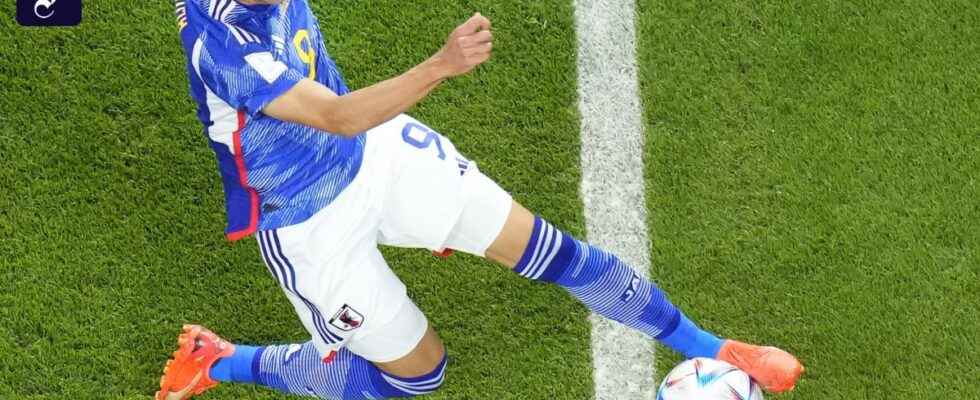Ghen it comes to the announcers and animators in the arenas, everything about this World Cup is great and amazing, really fascinating. The game between Japan and Spain was, of course, too. The warm-up at the microphone went over his head vocally, congratulating both teams on entering the next round. “Really amazing,” he exclaimed. It all depended on the point of view. There were also people who felt that what happened was less great. Rather “scandalous”.
Ever since the 1982 World Cup and the legendary non-aggression pact between Germany and Austria, who agreed without words but with their feet to a 1-0 draw to both advance and knock Algeria out of the tournament, duels on the last day of group matches have had at least a stale aftertaste, as long as both can be happy afterwards. This was no different in this case. Many question marks shimmered through the Qatari night, which nobody could or wanted to answer. Not even the next day.
The focus was on the Japanese goal to make it 2-1. Before Kaoru Mitoma’s crucial pass to Ao Tanaka, the ball was 99 percent of its circumference out of goal. At most a minimal part could still have touched the line, it was a matter of millimeters. Depending on the viewing angle or camera setting. One where the ball is clearly out of bounds was shown to Spain coach Luis Enrique.
His reaction shortly after the end of the game was emotional: “It can’t be. My first thought was, ‘This must be rigged,'” he said. What was real and what was fake, what was manipulated and what was real was discussed in the run-up to this World Cup like no other tournament. Especially in Germany. The team and association made few friends outside of their own country, especially not at the world governing body FIFA.
im off? Japan’s Kaoru Mitoma passes the ball in the middle at the goal line before firing it in for the 2-1 winner.
:
Image: dpa
In the history of the World Cup there have always been controversial decisions, these should be minimized by using the video assistants. “Nowadays there is great technology on the big football stage,” said Japan coach Hajime Moriyasu. “If the ball was really out of bounds, it wouldn’t have counted. But the referee decided that the ball was in.”
It was different on the field at first, as Victor Gomes from South Africa didn’t register a goal at first. Then the Mexican video assistant Fernando Guerrero answered. In the Bundesliga, the assistants on the screens are only called upon to intervene in the event of blatant errors. Whether this instruction also applies to the World Cup is not yet clear from the line of the referees. A lot seems random.
An example is Argentina’s penalty against Poland, when Lionel Messi was at most lightly touched in the face by the Polish goalkeeper. One tendency is that after the VAR intervenes, the previous judgment is changed. So also this time. After checking for several minutes, Gomes corrected himself.
A decision of enormous importance. In a draw between Japan and Spain, Germany would have progressed, not Japan. “It was half off for me, but I couldn’t really see it. If he spent it and didn’t count the goal, I would have accepted it and wouldn’t have been disappointed,” said the goalscorer Tanaka.
The disappointment on the Spanish side was limited, even if coach Enrique was agitated and contrite. “I’m not happy today because Japan won. There’s nothing to celebrate. We qualified, that’s all,” he said. There was no real effort on the part of his team to equalize.
In the round of 16, Spain meets Morocco on Tuesday (4 p.m. CET in the FAZ live ticker for the World Cup, on ARD and on MagentaTV). As a group winner, you should have played against Croatia on Monday. A possible clash with Brazil in the quarterfinals is also avoided after the defeat against Japan. Enrique, who had made major changes to his team and especially in the sensitive area of defence, didn’t want to hear about opponents who might be easier. There are no easy opponents at a World Cup, he grumbled.
Association president Luis Rubiales, who had met his Japanese colleague Kohzo Tashima hours before the game to sign a cooperation between the associations for the coming years, was in a better mood. After the World Cup, the cooperation should be started. Then there is a lot to do for Rubiales, he will also have to look for a new national coach.
Luis Enrique does not want to extend his expiring contract. How he finds that, Rubiales was asked these days. “Would I like it if Enrique continued? I would like to be world champion,” said Rubiales. The chances of that happening are still good. Despite or because of the defeat against Japan.
